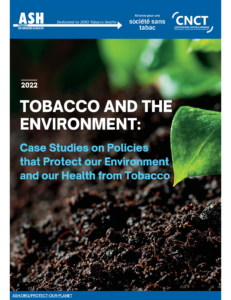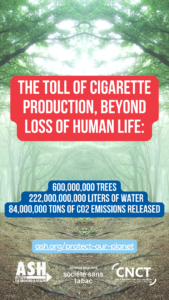Media Contact:
Nichelle Gray
(202) 659 – 4310
Our Environment Must be Protected from Tobacco Product Waste
New Report from 3 Organizations Highlights European Union, French, and American Progress

WASHINGTON, DC – MAY 25, 2022 – Tobacco Product Waste is a completely preventable and controllable environmental disaster. With natural resources being depleted and climate change accelerating, governments must take action to reverse trends. The European Union, France, and localities in the United States recognize that stronger regulations on tobacco can accelerate progress to protect our environment and our health at the same time.
Read the Report – Tobacco and the Environment: Case Studies on Policies that Protect our Environment and our Health from Tobacco
“From production through consumption and beyond disposal, cigarettes cause destruction to both our environment and human life,” said Kelsey Romeo-Stuppy, Managing Attorney at Action on Smoking and Health (ASH). “More governments should look to the EU, France, and US jurisdictions for creative ways to implement environmental policy to reduce, mitigate, and prevent the harm caused by the tobacco industry.”
Cigarette butts remain the most abundant form of plastic waste in the world with about 4.5 trillion individual butts littered each year. To contextualize that volume, 4.5 trillion cigarette butts is equal to 600 cigarette butts for every single living person.
“Tobacco companies promote policies that avoid all of their own environmental responsibility as the producer,” said Danielle Van Kalmthout of the Belgian Alliance for a Smoke Free Society and author of the European Union Case Study. “Tobacco companies attempt to divert public attention away from their environmental responsibilities through corporate social responsibility programs. They leave the external environmental costs to be borne by society and the low- and middle-income countries instead.”
And where tobacco companies do engage, it’s through front groups, as is detailed in the France Case Study chapter of this report. Those tobacco industry-influenced groups reject valid and crucial principles like Extended Producer Responsibility.
“To truly protect our environment, eco-organizations must retain complete independence from the tobacco industry as part of countries’ international commitments to the World Health Organization tobacco treaty,” said François Topart of the French National Committee Against Tobacco (Le CNCT) and co-author of the France Case Study.
The tobacco industry has spent decades manipulating the general public. Plastic, non-degradable filters were added to all cigarettes as a marketing ploy to appear like a new level of protection was added for consumers. Instead, an environmental catastrophe was added to the existing cigarette butt litter catastrophe.
“We encourage every jurisdiction to review the Polluter Pays Principles and Extended Producer Responsibility remedies available to them,” said Chris Bostic, Policy Director at Action on Smoking and Health and author of the US Case Study. “Obviously, Philip Morris USA sued the trailblazing City of San Francisco for their implementation of these policies, but the courts have already upheld the law, forcing tobacco companies to fund the cigarette butt cleanup costs that normally way heavily on local communities.”
Environmental policies offer several avenues for cities, states, and countries to lesson the tobacco epidemic and protect their local environment from tobacco product waste.
ACTION ON SMOKING AND HEALTH
Founded in 1967, Action on Smoking and Health (ASH) is America’s oldest anti-tobacco organization, dedicated to a world with ZERO tobacco deaths. Because tobacco is the leading cause of preventable death worldwide, ASH supports bold solutions proportionate to the magnitude of the problem. https://ash.org








